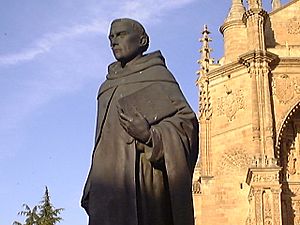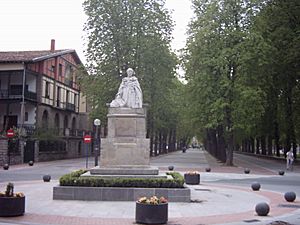Francisco de Vitoria facts for kids
Quick facts for kids
Francisco de Vitoria
|
|
|---|---|

Statue of Francisco de Vitoria at San Esteban, Salamanca
|
|
| Born | c. 1483 |
| Died | 12 August 1546 |
| Era | Renaissance philosophy |
| Region | Western philosophy
|
| School | Thomism School of Salamanca |
|
Main interests
|
Natural law |
|
Notable ideas
|
International law Freedom of the seas |
Francisco de Vitoria (born around 1483 – died August 12, 1546) was an important Spanish thinker. He was a philosopher, a theologian (someone who studies religion), and a jurist (a legal expert). He lived during the Renaissance, a time of great change in Europe.
Vitoria is known for starting the School of Salamanca, a group of scholars who studied law and economics. He is especially famous for his ideas on just war (when it is right to go to war) and international law (rules for how countries should act). Some people even call him the "father of international law." He also believed in the "freedom of the seas," meaning ships should be able to travel and trade freely across oceans.
Contents
Life of Francisco de Vitoria
Francisco de Vitoria was born around 1483 in Burgos, Spain. His parents, Pedro de Vitoria and Catalina de Compludo, came from noble families.
Education and Teaching
In 1504, Vitoria became a Dominican friar. This meant he joined a religious order. He studied in Paris, France, where he was influenced by the famous scholar Erasmus. From 1516, Vitoria taught theology.
In 1522, he returned to Spain. He taught theology at a college in Valladolid. Many young Dominicans there were preparing to be missionaries in the New World. In 1524, Vitoria became a professor at the University of Salamanca. He helped make Thomism, the ideas of St. Thomas Aquinas, very popular there. Francisco de Vitoria passed away in Salamanca on August 12, 1546.
Views on Native Peoples
Francisco de Vitoria was a respected scholar. Even Charles V, Holy Roman Emperor, the King of Spain, asked for his advice. Vitoria worked to limit how much power the Spanish Empire had over the Native Peoples of the New World.
Protecting Native Rights
Vitoria strongly believed that Native Peoples had their own rights. He said they had "true dominion" over their lands and property. This meant they owned their things just like Christians did. He argued that their leaders had real power over their tribes. He also said that Native Peoples could not be treated as slaves.
Vitoria used the idea of ius gentium, which means "the law of nations." This was an old Roman law concept. He believed that the dignity of every person was important. He felt that Spain's actions in the New World were violating this dignity.
Against Forced Conversion
Between 1537 and 1539, Vitoria gave several lectures. He stated that neither the Pope nor King Charles V had a right to control the lives or property of Native Peoples. He said that the Spanish could not use violence against them or take their lands. This was unless the Native Peoples had first harmed the Spanish by breaking their lawful rights.
Vitoria also argued against forcing Native Peoples to become Christians. He said that forced conversion would cause "great provocation and unrest." It would also create "immense hate" instead of true belief.
Property Rights and Taxes
Vitoria defended the Native Peoples from other unfair practices. Some people wanted to make them pay special taxes to encourage them to convert. Vitoria argued that Native Peoples could not be deprived of their goods just because they were not Christians. He said they had a true right to own their property.
Just War and Intervention
Vitoria supported the idea of a just war. This theory explains when a war is morally right. He believed that the Spanish actions in the Americas did not meet the conditions for a just war. The only time he saw a reason for Spain to get involved was to protect victims of human sacrifice. He felt these victims' human rights were being violated and needed defense.
Some people tried to argue that Native Peoples lacked reason. But Vitoria pointed out that they had their own customs, laws, and forms of government. This showed they were intelligent and capable.
The Requerimiento
The Spanish often used a document called the "Requerimiento" before fighting Native Peoples. This document declared the Pope's authority over the world. It also stated that the Spanish monarchs had received authority from the Pope to colonize and spread Christianity in the New World. The Native Peoples were told to accept Spanish rule or face force. Vitoria said this document was not lawful.
Vitoria also discussed arguments that justified Spanish actions. He said Spaniards had a right to travel freely and trade. This included searching for and taking natural resources in South America. He argued that if Native Peoples unlawfully stopped Spaniards from traveling, trading, or spreading Christianity, it could lead to a "just war." This war could then result in Spanish rule.
Vitoria never published his own works during his lifetime. His ideas are known from notes taken by his students. However, his influence was very important, especially on later thinkers like the Dutch legal philosopher Hugo Grotius. His collected lectures, Relectiones Theologicae, were published many times after his death.
Works

Notes from Francisco de Vitoria's lectures were copied by his students and published under these titles:
- De potestate civili, 1528
- Del Homicidio, 1530
- De matrimonio, 1531
- De potestate ecclesiae I and II, 1532
- De Indis, 1532
- De Jure belli Hispanorum in barbaros, 1532
- De potestate papae et concilii, 1534
- Relectiones Theologicae, 1557
- Summa sacramentorum Ecclesiae, 1561
- De Indis et De Jure Belli (a 1917 translation of part of the Relectiones Theologicae)
See also
 In Spanish: Francisco de Vitoria para niños
In Spanish: Francisco de Vitoria para niños
 | Delilah Pierce |
 | Gordon Parks |
 | Augusta Savage |
 | Charles Ethan Porter |

